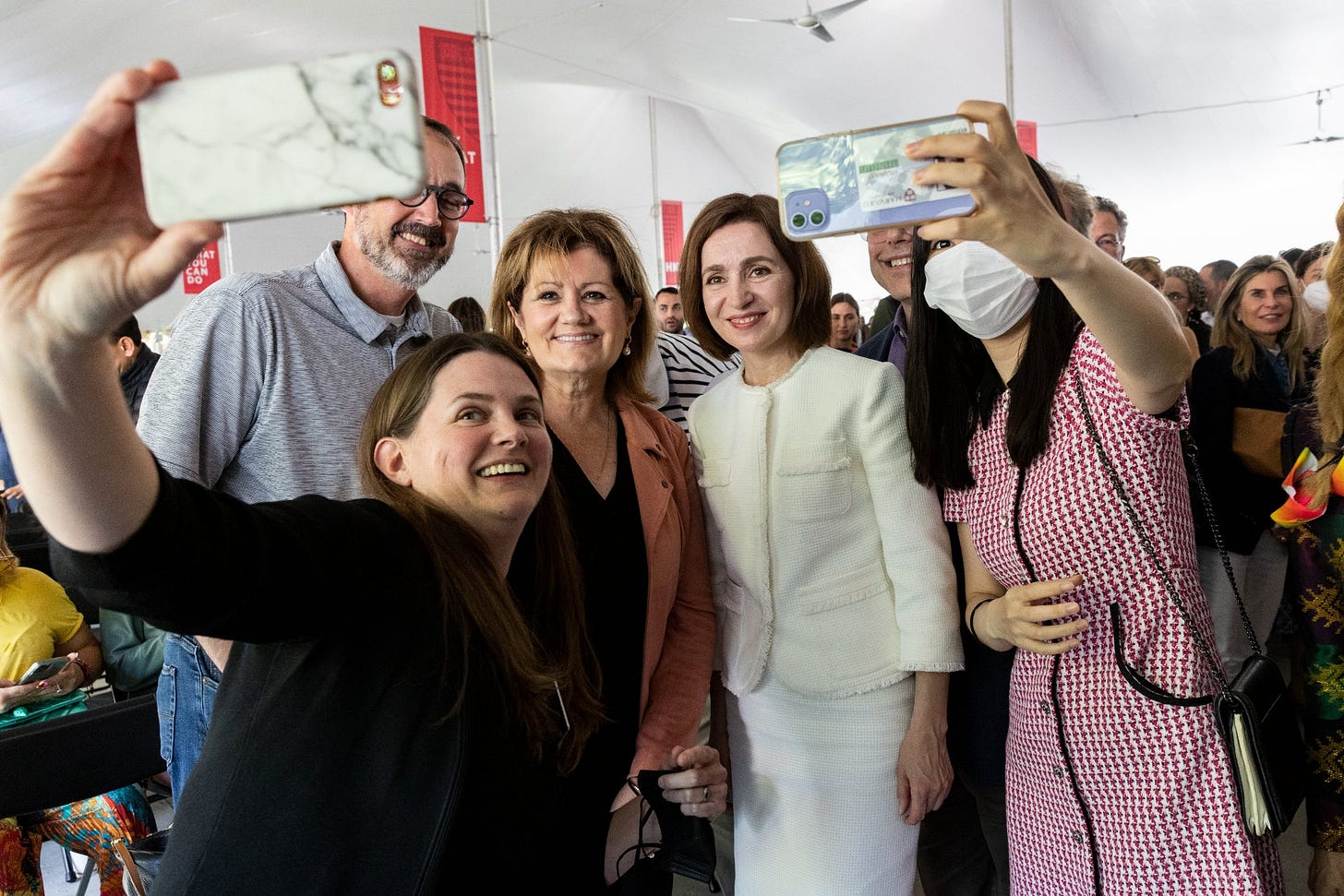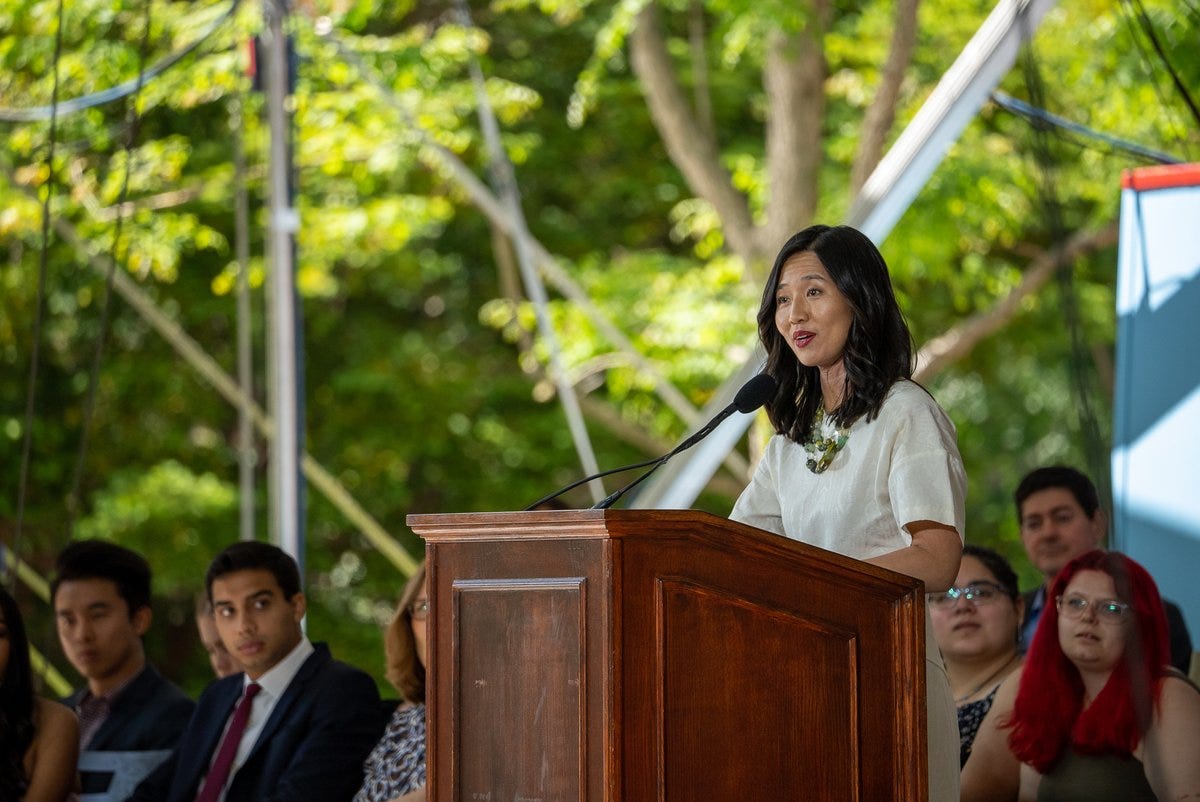At Harvard, three trailblazing women share their visions of leadership and politics, and other stories
#WomenLead (Issue 100): Your weekly round-up on women in politics
Hello, and welcome to Issue number *🥁🥁* ONE HUNDRED of #WomenLead! 💯
Thank you everyone for all the love and support you sent our way this last week as #WomenLead turned two. We are so overwhelmed and grateful! And what serendipity - for our 100th edition, we turn the spotlight on three trailblazing women from different parts of the world, and on the advice they had to offer as they were invited to deliver speeches at Harvard University’s commencement ceremonies last week. We also have updates from India, Spain and the UK.
In case you missed last week’s inspiring edition, you can read it here.
Quick Updates
🤮 SEXISM 101: In India, MP Supriya Sule was told to “go home and cook” by Chandrakant Patil, the head of the Maharashtra state unit of the Bharatiya Janata Party (BJP). Patil’s comment came up in the context of a debate over the Maharashtra government’s affirmative action policies for members of historically marginalized caste communities. “Why are you even in politics? Just go home and cook,” Patil remarked as he demanded the introduction of quotas for certain communities.
“Why are you even in politics?”: Imagine asking that question to someone who has been an MP since 2006, and has often been appreciated for their performance as a Parliamentarian!
Later, as he faced criticism for his remarks, he said it was “in his nature to respect women” (how lovely! We are truly grateful), and that his comment was made in a “rural” way of speaking. “I was speaking in rural language. In rural areas, often terms like ‘Ja Mhasnat (Go to hell)’ is used casually if certain work is not done. Even a mother says that to her child. It does not mean in literal sense,” The Indian Express quoted him as saying. Full marks for trying to come up with a creative defence, Mr. Patil. Sorry to inform you but it cuts no ice with us.
✊ ONWARDS & UPWARDS: Mohinder Kaur Midha has been elected the Mayor of Ealing Council in West London. Midha, who is of Indian origin, is the first woman from the Dalit community to be elected to the position. Midha was previously serving as the Deputy Mayor of the Council.



⚡ PATH-BREAKING: Spain passed the “yes means yes” bill - a legislation that emphasises the importance of consent when deciding upon cases of sexual violence. With the law, survivors of sexual violence will no longer need to prove violence or intimidation, or to prove that they physically resisted the assault. The new bill defines consent as an explicit expression of a person’s will, making it clear that silence or passivity do not equal consent, the Associated Press reported.
Irene Montero, Spain’s equality minister, played a key role in getting the legislation passed. “From today, Spain is a freer, safer country for all women,” she said after the law was passed.
Spotlight: GLOBAL 🌐🌐🌐
The past week saw various schools of USA’s Harvard University host their graduation ceremonies - the first set of in-person events since 2019. Among those invited to address the graduating students of different schools were three important women leaders from around the world – Boston Mayor Michelle Wu, Moldova’s President Maia Sandu, and New Zealand PM Jacinda Ardern.
Well done, Harvard University! Super cool and inspiring guest list! 👏👏👏
In today’s edition, we bring you selected excerpts from all three women, though we recommend watching/reading/listening to the full speeches!

Maia Sandu, Harvard Kennedy School 2022 Graduation Address
“I never intended to become a politician. I didn’t know how to do it. I realize that here at HKS and in other good places, many well educated, effective managers and sectoral leaders say they prefer to keep their distance from politics. People do not want to mess up with politics. I thought exactly the same. Up to a point. Up until I decided that I do not want to live in a country led by corrupt people. And this did not necessarily mean moving to a different country.
…The prospects of establishing a new political party from scratch were highly uncertain, the odds heavily against us. But this is what history teaches us that is the way to change a society. Would we succeed where others failed, many times over? It took quite some thought and ultimately a leap of faith to go into politics, instead of choosing a different, quiet and comfortable career path.
“Many well educated, effective managers and sectoral leaders say they prefer to keep their distance from politics. People do not want to mess up with politics.”
…Politics is what we make of it. You can be an outstanding leader in your organization, company, or institution. You can win small battles, enjoy victories, implement worthwhile strategies. But if you want real change that will directly impact communities and societies – you need to get into politics. Politics is about big, real, immediate and long-term impact. Political leadership is about educating society and setting an example and standards for the society. Shaping the future. It is about empowering people. At Harvard, we are all prepared to work hard, and dream big.
So do not be afraid. Get involved into politics, in the name of greater changes that we all need in these extremely challenging times. We need new leaders in politics, able to listen to and empathize with people, able to create enabling environments which would help people tackle tough challenges and thrive, as Professor Heifetz taught us. We need more people with integrity in politics. In all countries and international organizations that shape the future of our world.”
Read the full speech here, or watch it here.

Michelle Wu, Harvard College Class of 2022 ‘Class Day’ address
“Tell the truth when it’s hard. In this age of information overload and misinformation, curated social media feeds, tout connections often drive us further and further apart. In politics, and in family, and in work, speak to your truth and hold true to the urgency you feel. Because fundamentally, speaking the truth is the only way to build the foundations for trust. And that is what we are missing in our society and in our democracy today….To tackle the challenges we face today, we need to build trust in the urgency of the challenges by seeking the truth of the experiences of those on the ground.
“Speaking the truth is the only way to build the foundations for trust. And that is what we are missing in our society and in our democracy today.”
Seek the truth. Seek what’s real, what’s necessary and what’s not. Think about the impact, especially for those nearest to whatever issue you are trying to solve but not at the expense of those on the periphery. And when you find that truth, swim through the waves of misinformation and disbelief and incredulousness, and tell it. Tell the truth when it’s hard, uncomfortable and complex. And to the extent that you can, hold people through it, if they need to be held. But tell the truth. Tell it so we can build, and rebuild trust that is needed for our brightest future.
You can do anything. Choose to make what you do impactful, joyful and true.”
Find the full speech here.

Jacinda Ardern, Harvard Commencement Speech
“In June 1989 the Prime Minister of Pakistan stood on this spot and delivered the commencement address: titled “Democratic nations must unite.”
She spoke about her journey, the importance of citizenry, representative government, human rights, and democracy.
I met Benazir Bhutto in Geneva in June of 2007. We both attended a conference that drew together progressive parties from around the world. Just seven months later she was assassinated.
There will be opinions and differing perspectives written about all of us as political leaders. Two things that history will not contest about Benazir Bhutto. She was the first Muslim female Prime Minister elected in an Islamic country, when a woman in power was a rare thing. She was also the first to give birth in office.
The second and only other leader to have given birth in office almost 30 years later, was me. My daughter, Neve Te Aroha Ardern Gayford, was born on the 21st of June 2018. Benazir Bhutto’s birthday.
The path she carved as a woman feels as relevant today as it was decades ago, and so too is the message she shared here. In this place.
She said part way through her speech in 1989 the following:
“We must realise that democracy… can be fragile.”
I read those words as I sat in my office in Wellington, New Zealand. A world away from Pakistan. And while the reasons that gave rise for her words then were vastly different, they still ring true.
Democracy can be fragile.
“The foundation of a strong democracy includes trust in institutions, experts and government – and that this can be built up over decades but torn down in mere years.”
This imperfect but precious way that we organise ourselves, that has been created to give equal voice to the weak and to the strong, that is designed to help drive consensus – it is fragile. For years it feels as though we have assumed that the fragility of democracy was determined by duration. That somehow the strength of your democracy was like a marriage – the longer you’d been in it, the more likely it was to stick.
But that takes so much for granted.
It ignores the fact that the foundation of a strong democracy includes trust in institutions, experts and government – and that this can be built up over decades but torn down in mere years. It ignores that a strong democracy relies on debate and dialogue, and that even the oldest regimes can seek to control these forums, and the youngest can seek to liberate them.
It ignores what happens, when regardless of how long your democracy has been tried and tested – when facts are turned into fiction, and fiction turned into fact, you stop debating ideas and you start debating conspiracy. It ignores the reality of what we are now being confronted by every single day.”
Read the full speech here, or watch it here.
That’s a wrap for this week! Liked this edition? How could you not?! Press the ❤️ button and show us some love! And please, please do share this with a friend or on your social media accounts. There’s frankly nothing quite like reader love and endorsement, so please keep it coming! We’ll see you next weekend with Issue 101!
p.s. If you are reading this in Gmail, and this post landed in your “Promotions” tab, please move it to your inbox. This helps improve our visibility, and reduces the chances of this going to people’s spam folders. Thank you!



